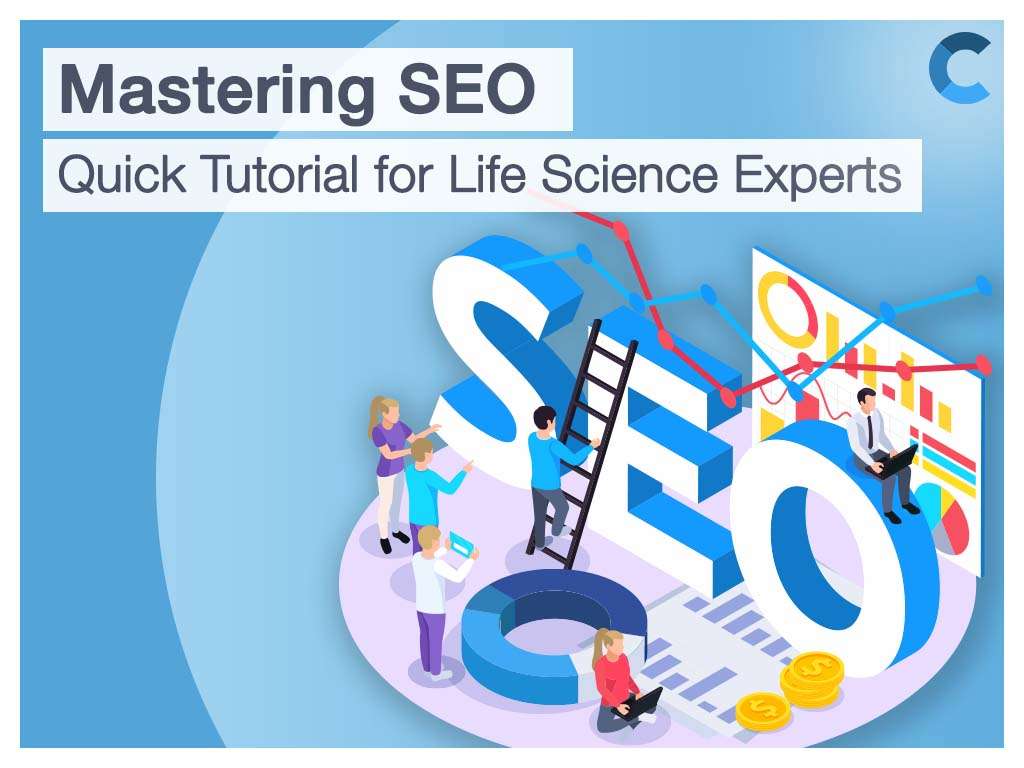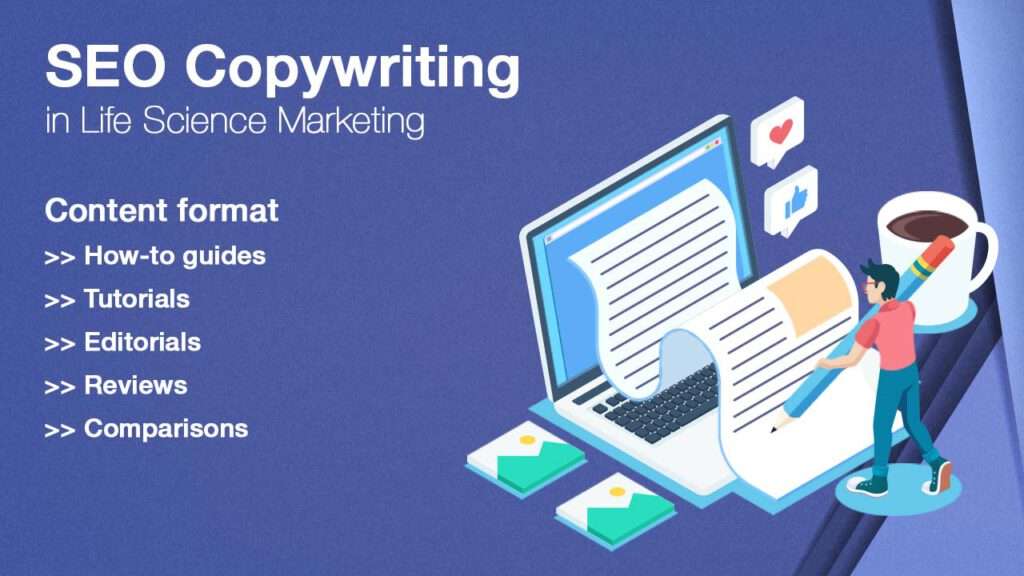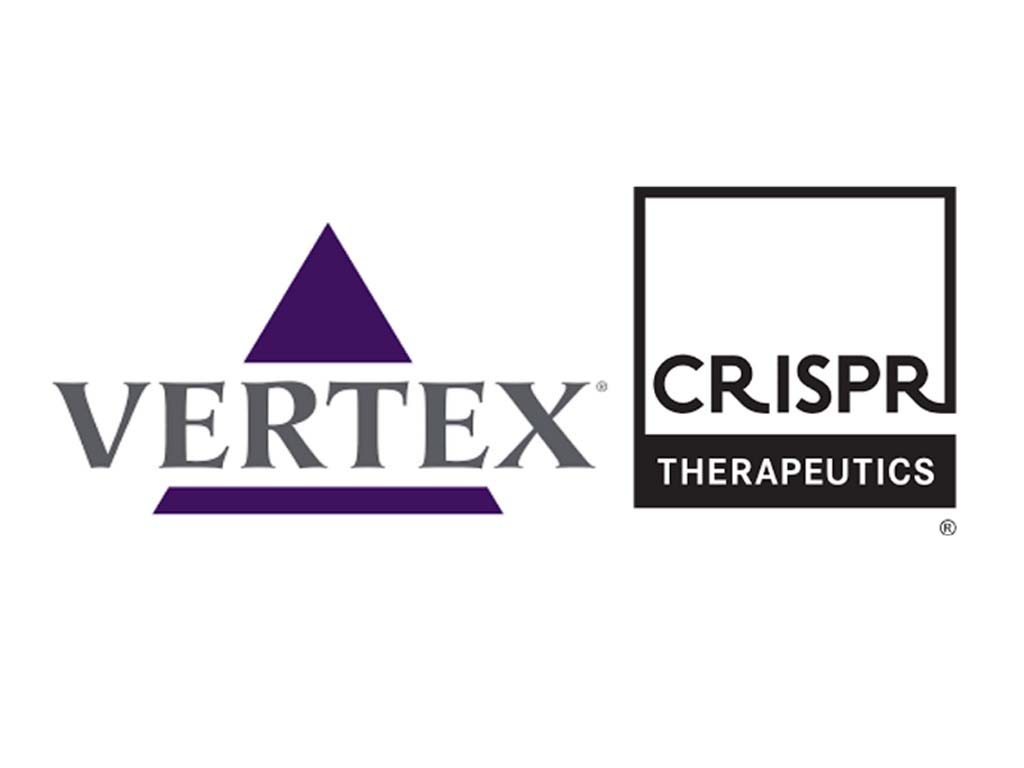Welcome to our comprehensive SEO tutorial on mastering search engine optimization for life science businesses. As a biotech, pharma, healthcare, medical, and lab tech expert, you realize the value of having a strong online presence to attract a larger audience to your website. Implementing successful SEO tools, SEO techniques, and digital marketing best practices is critical to attaining this aim.
This SEO guide will walk you through the process of optimizing your B2B website and blog posts to increase the search engine visibility of your product or service. We will discuss the fundamentals of search engine optimization, keyword research, on-page and off-page optimization techniques, and evaluating the performance of your SEO efforts.
Outline
ToggleKey Takeaways
- Mastering SEO is essential for businesses to enhance the online visibility of their webpage.
- Optimizing your life science company website using effective SEO strategies and best practices is crucial in attracting a wider audience.
- Understanding the basic concepts of SEO, conducting keyword research, and implementing on-page and off-page optimization techniques are essential in achieving success with SEO for life science businesses, as biotech, pharma, healthcare and related industries.
- Measuring the success of your SEO efforts is vital to monitor the effectiveness and impact of your strategies.
- Long-term digital marketing strategies and approach to SEO are necessary to sustain and continually improve your results.
Understanding the Basics of Search Engine Optimization (SEO)
Search engine optimization, or SEO for short, is an effective strategy for increasing the visibility of your websites. This is true for any business, regardless of the industry you are in. By optimizing your website for search engines, you can attract more visitors and boost your online visibility. Nonetheless, the significance of search engine optimization and content creation is frequently overlooked within the realm of the life science industry.
FACT SHEET
Backlinco
1. The #1 result in Google’s organic search results has an average CTR of 27.6%.
2. The #1 organic result is 10x more likely to receive a click compared to a page in the #10 spot.
3. Organic CTR for positions 8-10 is virtually the same. Therefore moving up a few spots on the bottom of the first page may not result in more organic traffic.
SEO strategies involve a combination of on-page and off-page optimization techniques. On-page optimization techniques include optimizing meta tags, creating high-quality content, and using technical SEO strategies. Off-page optimization techniques involve link building and social media promotion.
Optimizing websites requires a solid understanding of how search engines work and what they look for when ranking websites. By understanding the basics of SEO, you can effectively optimize your website and improve your search engine rankings.
SEO tips for life sciences include conducting accurate keyword research, optimizing meta tags, creating relevant content, and building high-quality backlinks. Conducting keyword research involves identifying relevant keywords that your target audience is searching for. The objective is to make your site more effective in obtaining high rankings for those key phrases.
One of the most important aspects of optimizing life sciences websites is creating quality content. Your content should be informative, well-structured, and engaging. Use relevant keywords throughout your content, but avoid keyword stuffing and focus on writing for your audience.
It’s also essential to use technical SEO strategies to improve your website’s performance. Technical SEO involves optimizing your website’s structure, URL structure, and other technical elements to improve your search engine rankings.
Understanding SEO and Google Search Ranking
SEO is the process of optimizing a website to rank higher in search engine results pages (SERPs). The goal of SEO is to improve the quantity and quality of traffic to a website through organic search engine results.
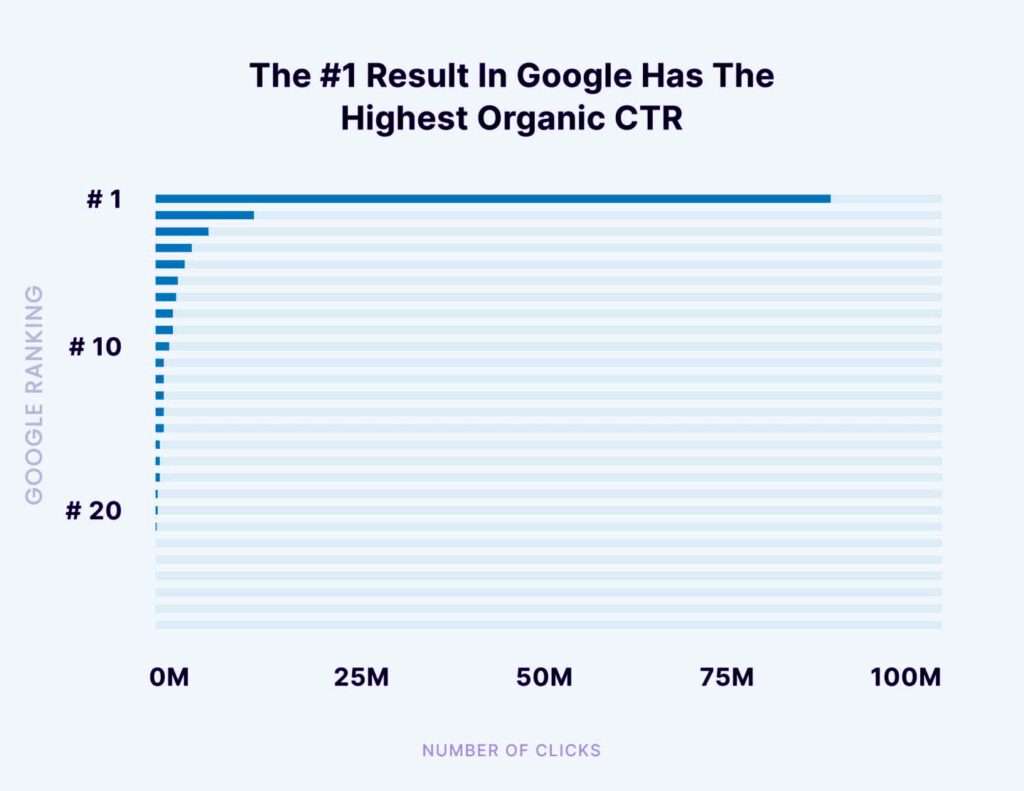
Search engines use complex algorithms to determine which websites to rank higher in their search results. These algorithms consider various factors. This includes the relevance of the content to the search query, the website’s authority, and the user experience.
SEO strategies for life sciences involve optimizing your website to rank higher in search engine results pages. This involves a combination of on-page and off-page optimization techniques.
On-page optimization techniques include optimizing meta tags, creating relevant quality content, and using technical SEO strategies. Off-page optimization techniques involve link-building and social media promotion.
Optimizing Content Marketing for Life Sciences Audiences
Optimizing life sciences websites requires a solid understanding of how search engines work and what they look for when ranking websites. By understanding the basics of SEO, you can effectively optimize your website and improve your search engine rankings.
SEO tips for life sciences include conducting target keyword research, optimizing meta tags, content creation, and building high-quality backlinks. Conducting keyword research involves identifying relevant keywords that your target audience is searching for and optimizing your website to rank for those keywords.
One of the most important aspects of optimizing websites is creating quality content with relevance to the audience’s search intent. Your content should be informative, well-structured, and engaging. Use relevant keywords throughout your content, but avoid keyword stuffing and focus on writing for your audience.
It’s also important to use technical SEO strategies to improve your website’s performance. Technical SEO involves optimizing your website’s structure, URL structure, and other technical elements to improve your search engine rankings.

Conducting Keyword Research for Life Sciences Marketing
Keyword research is a vital component of any comprehensive SEO strategy. Performing thorough research for life sciences websites can help you identify the most relevant and lucrative short-tail and long-tail keywords, as well as the underlying difficulty of those keywords (keyword competition). This will help you build a web presence that’s designed to get traffic from search engines.
When conducting keyword research for life science audiences, it’s essential to understand the search intent of your target audience. Are they searching for information about a specific disease, treatment, or drug? Are they looking for applications or research studies? By understanding the search intent, you can tailor your keyword research and optimize your content accordingly.
Tools like Google Keyword Planner, Ahrefs, SEMrush, Ubersuggest, and Moz Keyword Explorer can help you identify keywords that are relevant and have high search volume. These tools can also provide insights into the competitiveness of various keywords, allowing you to prioritize and target the most valuable ones.
It’s important to note that keyword research is an ongoing process. As search trends and user behavior change, so do the keywords that are relevant for your website. Regularly reviewing and updating your keyword strategy can ensure that your website remains optimized for search engines and continues to attract relevant traffic.
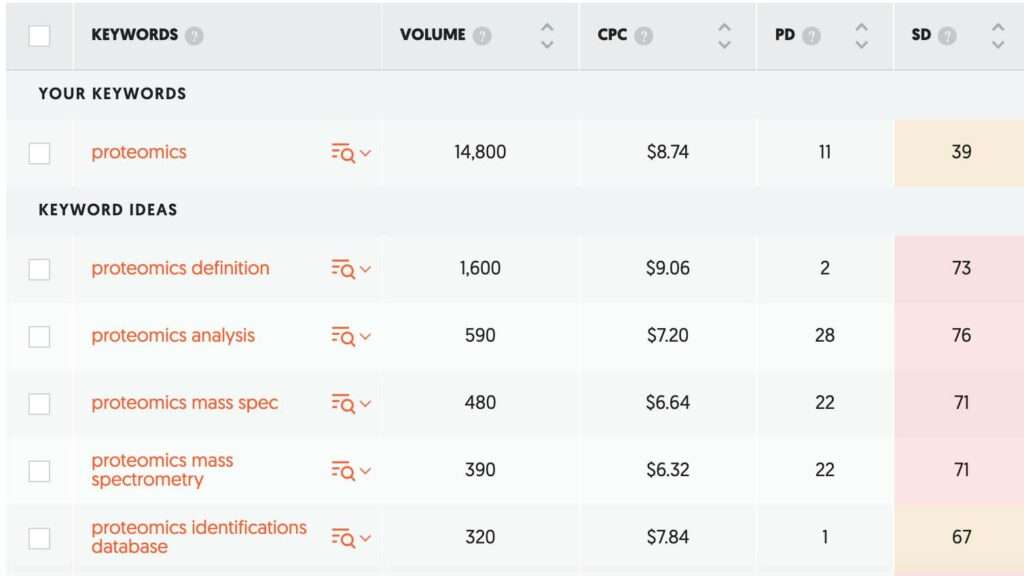
In conclusion, conducting keyword research is a crucial step in optimizing your website for search engines. By understanding the search intent of your audience and using the right tools, you can identify valuable keywords and create content that resonates with your target audience. Don’t underestimate the importance of keyword research in your overall SEO strategy.
Implementing On-Page SEO Techniques
When it comes to optimizing your business website for search engines, on-page optimization is an essential aspect of the process. On-page SEO involves implementing strategies on your website to improve its visibility and ranking on search engine results pages (SERPs).
Here are some on-page SEO basics to help with life sciences website optimization:
| On-Page SEO Techniques | Description |
|---|---|
| Meta Tags Optimization | Meta tags are snippets of text that describe a page’s content. Ensure that each page on your website has unique meta titles and descriptions that accurately reflect the content on the page. |
| Keyword Optimization | Include relevant keywords in your content without overloading your pages with them. Keyword stuffing can negatively impact your search engine rankings. |
| Image Optimization | Ensure that your images have relevant file names and alt tags that describe their content accurately. This can help to improve the accessibility of your website, as well as boost your SEO. |
| Content Optimization | Creating high-quality, relevant, and engaging content is crucial for on-page optimization. Your content should be well-structured, easy to read, and contain appropriate keywords and relevant links. |
| Sitemap | A sitemap is a file or inventory of a website’s pages within a given domain. It assists search engines in discovering, crawling, and indexing a website’s entire content, as well as understanding the relationships between pages and the relative importance of each page. |
| Technical SEO Strategies | Technical SEO involves optimizing your website’s technical elements to improve its speed, accessibility, and functionality. This may include improving site speed, implementing schema markup, and ensuring that your website is mobile-friendly. |
By implementing these on-page SEO techniques, you can optimize your website for search engines and improve its ranking on SERPs. Remember, on-page SEO is just one aspect of optimizing your website. Be sure to also explore off-page SEO strategies for a comprehensive approach to optimizing your website’s visibility and ranking.
Mastering Off-Page SEO
Off-page SEO is a critical component of improving search engine rankings for life sciences websites. In addition to on-page optimization, off-page SEO focuses on external factors. Those are backlinks, social media engagement, and online reputation management.
One effective off-page SEO strategy is to build high-quality backlinks from reputable sources. This involves reaching out to other websites and requesting them to link back to your content. It’s essential to ensure the links are relevant, credible, and add value to the reader.
Another effective strategy is social media engagement. Social media channels provide an excellent opportunity to interact with the target audience and promote your content. By sharing informative and relevant content, you can build a loyal following and improve your online reputation.
Online reputation management is another crucial factor in off-page SEO. Ensuring that your website has positive reviews and feedback can enhance your credibility and attract more visitors.

SEO Strategies in the Life Sciences
When implementing off-page SEO strategies for life sciences websites, it’s essential to focus on the specific needs and preferences of the target audience. Understanding their search behavior and preferences can help identify the most effective strategies to attract and retain visitors.
One effective strategy is content creation that addresses the needs and interests of the audience. By providing valuable and engaging content, you can attract more visitors, increase engagement, and improve your online reputation.
Another valuable strategy is to leverage industry influencers to promote your content. Influencers have a significant impact on consumer behavior and can help improve your credibility and online reputation.
Improving SEO for Businesses
Improving SEO for life sciences websites requires a long-term commitment to implementing effective strategies and regularly measuring the impact of those strategies. In addition to the strategies discussed above, other effective tactics include guest blogging, participating in online forums, and utilizing online directories.
Ultimately, the key to improving SEO is to focus on providing value to the target audience and building a strong online reputation. By implementing effective on-page and off-page SEO strategies, life sciences experts can significantly enhance their online presence and attract a wider audience.
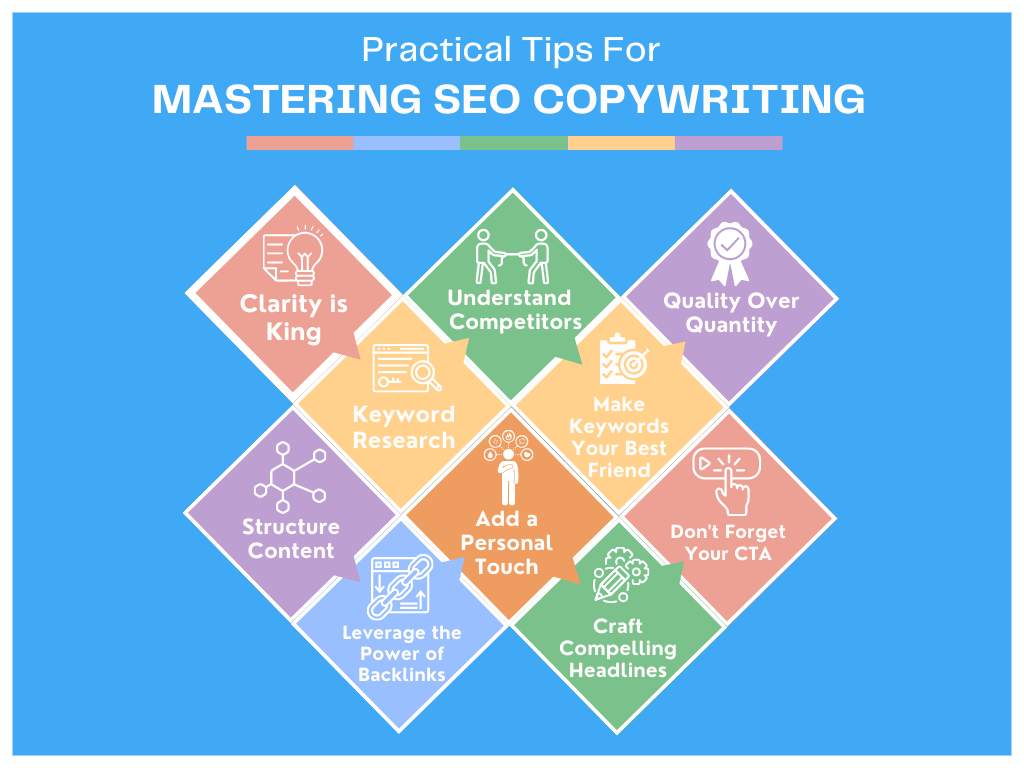
Measuring SEO Success and Long-Term Strategies
As with any marketing effort, measuring the success of your SEO strategies is vital. By tracking and analyzing various SEO metrics, you can evaluate the effectiveness of your tactics and make necessary adjustments to improve your search rankings.
One important metric to monitor is organic traffic, which refers to the number of visitors who arrive at your website through search engine results pages (SERPs). Another crucial metric is the click-through rate (CTR), which measures the percentage of users who click on your website’s link after seeing it in search results. Additionally, you should keep an eye on your website’s bounce rate, which indicates the percentage of visitors who leave your site after viewing only one page.
It is important to note that SEO is a long-term strategy, and it can take time to see significant results. Therefore, it is essential to have a plan for sustaining and continually improving your SEO efforts. This could include regularly updating your website’s content, conducting regular keyword research, and building quality backlinks to your site.
Investing in on-going SEO efforts can lead to long-term benefits, such as improved online visibility, increased brand awareness, and higher website traffic. By continually analyzing and adjusting your strategies to align with search engine algorithms and user behaviors, you can stay ahead of the competition and attract a wider audience for your life sciences website.
Take Action Today
With the comprehensive tutorial on SEO for life sciences experts, you can now achieve higher search engine rankings, attract more traffic to your website, and generate leads for your business. By understanding the basics of SEO, conducting keyword research, implementing on-page and off-page SEO techniques, and measuring your success, you can create a sustainable SEO strategy that yields long-term results.
Don’t wait any longer to enhance your online presence. Start implementing the basics, strategies, and tips discussed in this SEO guide today. Remember to continually monitor and analyze your results to improve your SEO efforts over time. By mastering SEO, you can position your life sciences business as a thought leader in the industry and attract a wider audience to your valuable products and services.
Frequently Asked Questions
What is SEO?
SEO, or Search Engine Optimization, is the practice of optimizing a website to improve its visibility on search engines. Dive into our SEO tutorial to learn how to optimize your content effectively.
SEO is a crucial aspect of digital marketing. By understanding keyword difficulty, conducting SEO keyword research, and implementing on-page and off-page SEO techniques, websites can achieve better rankings. SEO isn’t just about keywords; it’s about understanding how people search and ensuring your content meets their needs.
Why is SEO important for life sciences websites?
SEO is crucial for life sciences websites to increase their online visibility, attract targeted traffic, and establish credibility in the industry. It helps potential users and customers find relevant information, products, and services, ultimately driving conversions and growth.
For those who are eager to learn SEO, starting with the basics is essential. Keyword research, understanding keyword difficulty, and knowing the importance of backlinks are foundational. Technical SEO problems, like issues with sitemaps or meta tags, can hinder your site’s performance.
How long does it take to see the results of SEO efforts?
SEO, as a key component of digital marketing, requires patience and consistent effort. The time it takes to see the results of SEO efforts can vary depending on various factors, such as the competitiveness of keywords, the quality of content, the authority of the website, and the effectiveness of the strategies employed. Specialized sectors, like life science marketing, may have different timelines due to niche competition and audience behavior.
While some technical SEO fixes can lead to immediate improvements, aspects like link building and content marketing often take time to show significant results. It’s essential to understand that SEO isn’t a one-time task; it’s an ongoing process influenced by factors like keyword difficulty, competition, and search engine algorithms. Generally, it can take several weeks to months to see significant improvements in search engine rankings.
Are there any risks associated with SEO?
While SEO is largely considered safe and effective, there are certain risks involved, especially when employing unethical or black-hat SEO tactics. These can result in penalties from search engines, negatively impacting your website’s rankings and online reputation. It’s essential to approach SEO with a focus on best practices, avoiding shortcuts that might seem tempting but can lead to long-term issues.
Tools like Google Search Console can help identify potential issues, while the Google Keyword Planner can guide keyword strategy to avoid overly competitive or spammy arenas. Especially in specialized sectors like life science marketing, understanding the nuances and potential risks is paramount.
Do I need to hire an SEO agency or SEO professional for my B2B website?
Hiring an SEO agency can be beneficial, as they have the expertise and resources to develop and execute effective SEO strategies. However, using an SEO service is not a requirement, and you can learn and implement SEO practices on your own with the proper knowledge and guidance.
Starting with an SEO tutorial for beginners is a great way to grasp the fundamentals. Focus on understanding the relationship between SEO and content, how to conduct keyword search effectively, and the importance of creating high-quality content. Tools like Google Trends can provide insights into popular search terms, while resources like SEO videos and articles can offer visual and in-depth explanations.
As you delve deeper, you’ll discover the role of data science and machine learning in SEO, helping you refine your strategies for better results. Remember, complete SEO is a continuous learning process, so stay curious and updated with the latest trends and practices.
How often should I update my website’s content for SEO purposes?
Updating your website’s content regularly is important for SEO ranking. It helps search engines perceive your site as active and relevant. The frequency of updates can vary depending on your industry and content strategy, but aim to publish fresh and valuable content consistently to attract and engage your target audience.
How can I optimize my website for mobile users?
Mobile SEO is crucial in today’s digital landscape. It ensures that your website is fully optimized for mobile users. To master mobile SEO, it’s essential to have a responsive design that adjusts to different screen sizes. Google SEO guidelines also emphasize the importance of mobile-first indexing. Regularly test your site on various devices, focus on fast loading times, and ensure that interactive elements work seamlessly. Staying updated with online marketing trends and SEO research can provide insights into emerging mobile SEO practices.
How can I track the success of my SEO efforts?
To track the success of your SEO efforts, you can utilize various metrics and tools. These include monitoring your website’s organic traffic, keyword rankings, conversion rates, bounce rates, and backlink profile. Google Analytics and Google Search Console are valuable tools for tracking and analyzing these metrics.
No related posts.

